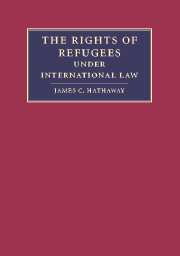Book contents
- Frontmatter
- Contents
- Acknowledgments
- Table of cases
- Table of treaties and other international instruments
- Abbreviations for courts and tribunals cited
- Introduction
- 1 International law as a source of refugee rights
- 2 The evolution of the refugee rights regime
- 3 The structure of entitlement under the Refugee Convention
- 4 Rights of refugees physically present
- 5 Rights of refugees lawfully present
- 6 Rights of refugees lawfully staying
- 7 Rights of solution
- Epilogue: Challenges to the viability of refugee rights
- Appendices
- Select bibliography
- Index
1 - International law as a source of refugee rights
Published online by Cambridge University Press: 06 January 2010
- Frontmatter
- Contents
- Acknowledgments
- Table of cases
- Table of treaties and other international instruments
- Abbreviations for courts and tribunals cited
- Introduction
- 1 International law as a source of refugee rights
- 2 The evolution of the refugee rights regime
- 3 The structure of entitlement under the Refugee Convention
- 4 Rights of refugees physically present
- 5 Rights of refugees lawfully present
- 6 Rights of refugees lawfully staying
- 7 Rights of solution
- Epilogue: Challenges to the viability of refugee rights
- Appendices
- Select bibliography
- Index
Summary
A study of the rights of refugees under international law must first stake out a position on the critical question of what counts as international law. There is, of course, a simple answer to this question: refugee rights are matters of international law to the extent they derive from one of the accepted trio of international law sources: treaties, custom, or general principles of law. But while technically correct, this facile response fails to do justice to real disagreements about how rules derived from custom or general principles are to be identified and, more specifically, about whether general rules of recognition can fairly be applied to the identification of human rights norms. While this book in no sense aspires to analyze these concerns in depth, it begins with a brief explanation of the reasoning which led to the adoption here of a relatively conservative understanding of the sources of both custom and general principles premised on a consent-based, modern positivist view of international law.
In the second part of this chapter, the rules of recognition are applied to determine whether there are human rights derived from custom, general principles of law or treaties of universal reach which, by virtue of the generality of those sources of law, inhere in all persons. Any protections guaranteed by all states to all persons will, of course, accrue to the benefit of refugees.
- Type
- Chapter
- Information
- The Rights of Refugees under International Law , pp. 15 - 74Publisher: Cambridge University PressPrint publication year: 2005
- 1
- Cited by



